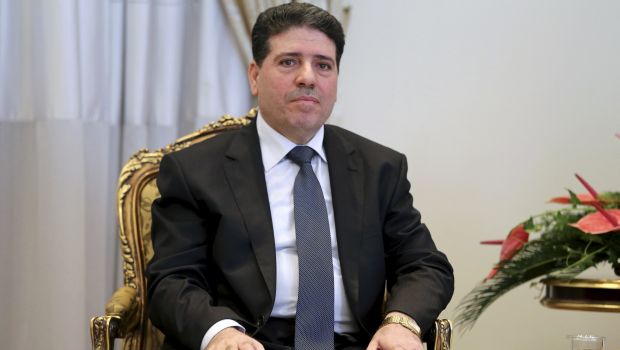
Syrian Prime Minister Wael Nader A
l-Halqi meets with Iran’s President Hassan Rouhani at his office in Tehran, Iran, Sunday, Dec. 1, 2013 (AP Photo)
In a speech at the final session of 2013 of the Syrian People’s Assembly, he said: “We are open to all suggestions at the Geneva II conference if it is held on January 22, but we will not make any decisions that disagree with the aspirations of the Syrian people, and everything that is proposed at the negotiation table in Geneva will be put to a referendum, because the Syrian people have the right to decide their own future.”
Halqi also reiterated the Syrian government’s position that “anyone who thinks the Syrian delegation was going to the international conference on Syria to hand over power to others must be delusional.”
In his speech, Halqi also paid tribute to the Syrian government’s principal international backers, Russia and Iran, who he said had allowed Syria to make “diplomatic achievements” that he hoped would translate into action at the conference.
“Had it not been for this coordination, especially at the [UN] Security Council through the vetoes that were used by Russia and China, the situation would have been different.,” he added.
While the Syrian government said it had already chosen its delegation, to be led by Foreign Minister Walid Al-Mouallem, the opposition Syrian National Council (SNC) said its final decision on participation would be made at a meeting in the first week of 2014.
Former Chairman of the SNC and member of the Coalition, Abdelbasset Sida, told Asharq Al-Awsat that “the final decision on participation had not been made yet, despite the fact that the Coalition had announced its provisional agreement to a conditional participation in any international meeting aimed at resolving the Syrian crisis.”
Sida said the initial decision by the Coalition “was based on international documents issued by the UN, the London Conference, and the meeting of the Arab foreign ministers, all of which, according to President Bashar Al-Assad, had no role to play in the transitional process.”
Sida added: “The constant bombardment of Aleppo and the tightening of the siege in other Syrian areas, in addition to the negative international parties’ position, if not their failure to influence the regime, may compel the opposition to refrain from participation.”
This comes amid differences on participation within the opposition. Some of the armed opposition groups inside Syria “do not believe the international community is serious about resolving the crisis.”
Sida reiterated that there would be participation without the agreement of the revolutionary forces inside Syria. He said: “We cannot go to any meeting which aims to resolve the issue, without total coordination with military forces inside.”
Meanwhile, the parties that support the conference have not agreed on Iran’s participation due to objections by the US. Damascus announced on Sunday that it insisted on the participation of Iran, its strongest regional ally.
The Geneva II conference will be attended by representatives of the European Union, Organization of Islamic Cooperation (OIC), Algeria, Brazil, Canada, Denmark, Egypt, Germany, India, Indonesia, Iraq, Italy, Japan, Jordan, Kuwait, Lebanon, Morocco, Norway, Oman, Qatar, Saudi Arabia, South Africa, Spain, Sweden, Switzerland, Turkey and the United Arab Emirates.
The extended conference is expected to be held in Montreux, Switzerland, on January 22, while the negotiations between the two Syrian delegations—the government and the opposition—are due to start on January 24 in Geneva, attended by UN peace envoy to Syria Lakhdar Brahimi and representatives of Moscow and Washington.
